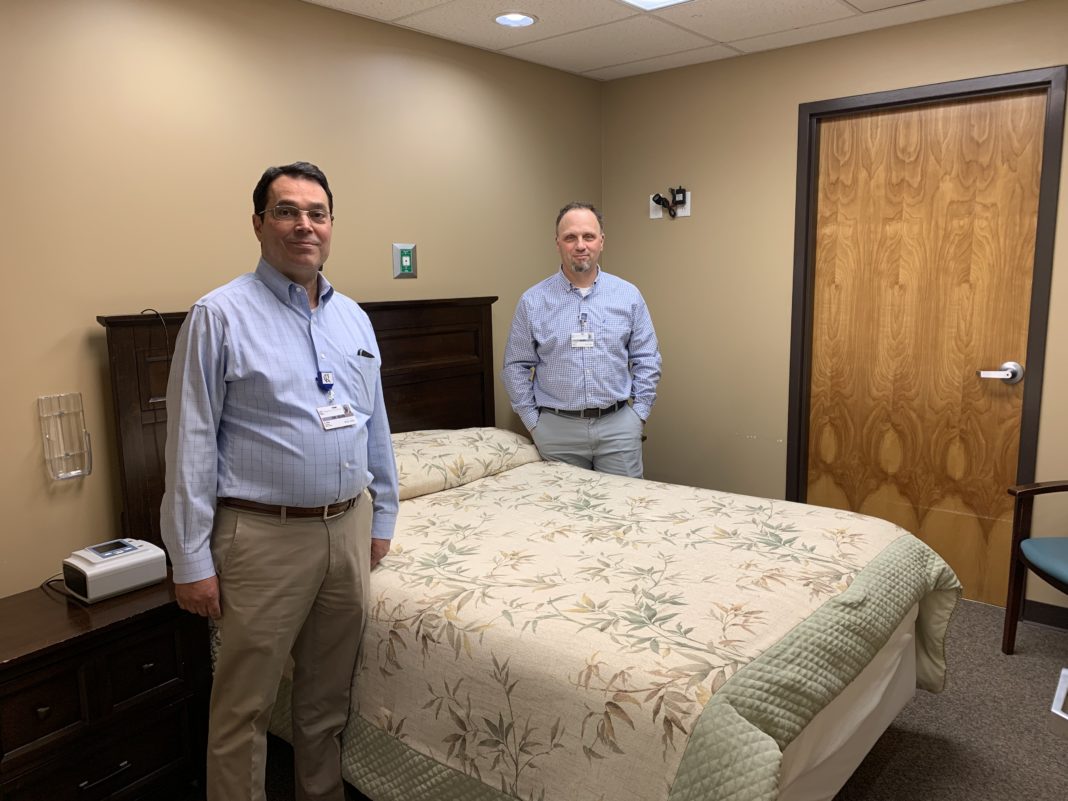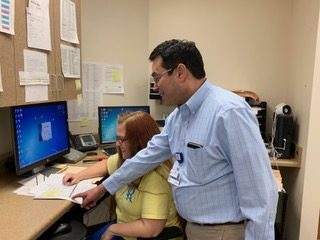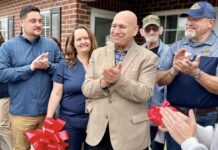
By Michelle Price
Special to the UCBJ
COOKEVILLE – Tired of waking upfeeling as tired as when you went to bed? Having trouble getting to sleep at all? The physicians at the newly accredited Sleep Center at Cookeville Regional Medical Center (CRMC) have helped thousands in the UC to finally get some rest. The Sleep Center diagnoses and treats all kinds of sleep disorders including insomnia, restless leg syndrome, narcolepsy and sleep apnea.
The Sleep Center at CRMC is a full-service sleep center with a sleep clinic on site staffed by two board certified sleep doctors, Dr. James Davis and Dr. Steven Silas, and a nurse practitioner, Lori Joines.
“We are very, very lucky to have Dr. Davis and Dr. Silas because it’s hard to find board certified sleep physicians and we have two here,” said Scott Clayton, Sleep Center director. “You can find them in Nashville, and you can find them in Knoxville, but you don’t find them in this area. So, it’s really big for the community to have that quality of physician here to take care of their sleep needs.”
The Sleep Center recently received program accreditation from the American Academy of Sleep Medicine (AASM), considered the gold standard in its specialty. This accreditation evaluates all aspects of the center including its goals and plans for improving medical care in the community.
“The Sleep Center at Cookeville Regional Medical Center is an important resource to the local medical community and will provide academic and scientific value in addition to the highest quality care for patients suffering from sleep disorders,” said Dr. Douglas Kirsch, AASM president.
The Sleep Center does eight studies a night and over 2,000 studies a year in addition to clinic patients that don’t get full sleep studies. With some of the patients, the doctors feel they don’t need a sleep study.
“Because you come to see a sleep doctor doesn’t always mean that you are going to have to go through a sleep test,” said Clayton. “This is to see what’s going on and why you feel terrible and why you can’t sleep. That’s what we are trying to figure out. Sometimes it’s a test that we have to do to figure that out. Sometimes we understand it’s just insomnia.”
Many different symptoms bring patients to the sleep center.
“The most common one is either ‘I can’t sleep’ or ‘I sleep too much,’” said Dr. Silas. “Those are really the two broad categories but then there’s the third one that’s ‘My spouse told me to come.’ That is common too. Snoring and kicking.”
Often a patient doesn’t realize why they aren’t getting a good night’s sleep. It’s impossible to know everything your body is doing while you are not awake. That’s why the sleep center sends out questionnaires before a patient’s first visit.
“When we send out the questionnaires, we always send out a sleep partner questionnaire, because we want to know what the person sleeping with you says,” Clayton said. “They are usually the ones that say, ‘Yes, you do, too’, ‘You snore.’”
“You snore and you kick,” added Dr. Silas. “Sometimes they will say something like ‘you know, you gave me a black eye.’ They woke up with a black eye and don’t know where it came from.”
“We see a lot of different things,” said Clayton.
The Sleep Center works mostly on referrals from doctors, but as long as a patient’s insurance doesn’t require a referral to see the doctor, patients can refer themselves to the Sleep Center.
“We encourage referrals from the doctors instead of self-referrals because a lot of times it is tied into other medical problems such as diabetes and high blood pressure,” said Silas. “It’s good that they are connected with a primary care doctor too.”
“We want to work with the PCP’s (primary care physicians) because we’re no different than cardiology or neurology,” added Clayton. “You go to them for those specialties and we’re a specialty.”
Most patients come into the center seeing either Dr. Silas, Dr. Davis or Lori (the FNP) to do the first initial consult, talk about the sleep study and discuss what is going to happen during the procedure.
Often a patient will discuss their problems and the staff will determine that a sleep study is not the appropriate option.
“If appropriate,” stressed Dr. Silas. “We’re a sleep center not a sleep testing center.”
“There’s lots of people with insomnia,” explained Clayton. “There’s people with narcolepsy, restless leg syndrome. We treat many different disorders. There’s over 100 different sleep disorders.”
“Jet lag is considered a sleep disorder,” shared Dr. Silas.
Sleep studies are much more involved than most standard medical testing.
“The process for a patient to have a sleep study is extensive sometimes,” Clayton said. “The patient has to come in and have a full night’s sleep the first night so we can see what’s wrong with you. That can consist of wires on your head so we can monitor brain waves so we can see what sleep stage you are in and then we score it.

“We have people here that score all sometimes 800+ pages of data. They have to go through and score each one of the events. After they score the events, these guys (the doctors) go in and look at it. They look at all of the events on the same pages and they will compile a report. If the report says they are positive for sleep apnea or anything else, they will bring them back in and will retest them again and put them on the continuous positive airway pressure (CPAP) machine.”
The sleep study will help the doctors determine what type of sleep disorder or issue the patient has. In addition to the pages of data, there is also a video to help determine leg movements, etc.
“It helps determine if someone has a sleep disordered breathing problem, like sleep apnea, or if they have leg movements during their sleep, or if they have essentially mediated sleepiness such as narcolepsy,” said Dr. Silas. “There is a range of treatments, but it usually comes down to something to support breathing most of the time and those are really limited.
“There are different ways to approach having someone stay asleep if it’s something other than sleep apnea. I’m mainly talking about insomnias. There’s more than just medication. There’s behavioral changes that can be made. But people don’t want to hear ‘put down the phone, turn out the light and go to bed.’ That’s simple but hard to execute.”
CPAP machines have been around for the past 50 years but have improved greatly over the past 20 years.
“There’s technology in the machines now that can ramp up the pressure while you go to sleep,” said Clayton. “It syncs with your breathing better. It’s not as invasive. The technology has changed quite a bit which makes the compliance better. And the mask has changed which makes the compliance better.”
“It’s like medication,” said Dr. Silas. “Is it a nuisance? If you don’t have sleep apnea, then it is a nuisance. But, if you do have sleep apnea, it’s like taking any medication. It’s meant to help not to taste bad.”
Clayton welcomes any patient to come in and work with the technicians on enhancing the experience. Every technician at the Sleep Center is registered by the Board of Polysomnography and the doctors are certified by the Board of Sleep Medicine.
“We have people here with years of experience,” said Clayton. “We know how to talk to patients and make them feel comfortable. We bring patients in sometimes just to wear a mask and lay down in one of our beds while a technologist works out mask issues with them and desensitizes them to the process.
“It’s a process just like anything else though. Sometimes you have to make lifestyle changes that aren’t always so fun but if you can wear a mask or make a couple of changes and you sleep better and you feel better, it was worth it.”
The Sleep Center at Cookeville Regional Medical Center is located at 100 West 4th Street, Suite 350. For more information call 931-783-2753 or visit https://crmchealth.org/sleep-center.








